When he visits Puerto Rico next week, President Donald Trump should stop by the national cemetery in Bayamon and pay his respects at Grave 41 in Section A. The granite tombstone there reads:
“ELMY LUIS MATTA
1LT US ARMY WWII KO
DSC PH
MAY 26, 1921 AUG 3, 1950”
KO stands for the Korean War, which was just beginning at the time of Matta’s death and remains unresolved. DSC for Distinguished Service Cross, PH for Purple Heart. The citation for the DSC attests that it was awarded in recognition of “extraordinary heroism in action against enemy aggressor forces near Kumchon, Korea, on 3 August 1950.”
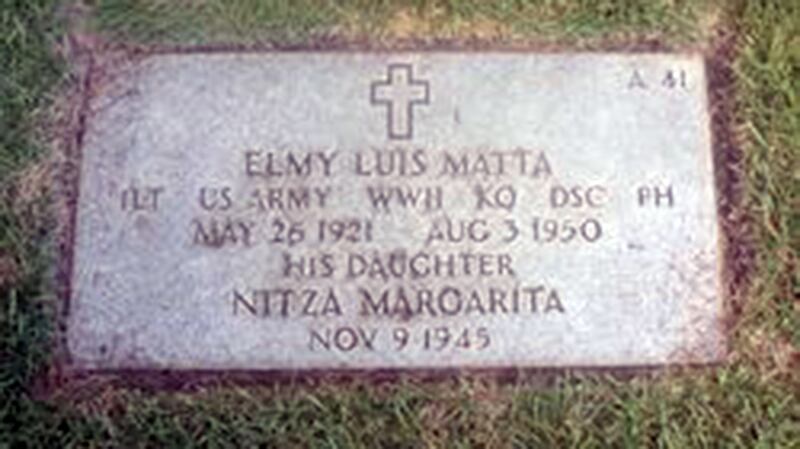
Elmy Matta's grave.
Courtesy Rocio AlonsoThe citation continues: “On that date, Lieutenant Matta was assigned mission of destroying an enemy road block which had cut the Division supply route and personally led the assault of his company against the enemy in the face of intense small arms and automatic weapons fire. Even after expending all his ammunition, Lieutenant Matta pressed the attack with his bayonet, causing the enemy to bolt and run. During this action, Lieutenant Matta was killed. His fearlessness and aggressive leadership inspired his company to eliminate the enemy and successfully complete the mission.”
Elmy Matta was the oldest of six children, raised by a single mom in the Puerto Rican town of Mayaguez, three boys and three girls, all of whom served in the military. The mother was a seamstress extraordinaire and ran a boarding house. She delighted her incandescent Elmy, who was brilliant and fun and loved by all. He was a talented guitarist and had a fine singing voice.
“The light of the house,” his niece, Rocio Alonzo, told The Daily Beast “He was a very happy person.”
When she was notified of 29-year-old Elmy’s death, his mother seemed to age decades in just a day.
“She never recovered,” Rocio said. “She was very strong, but nobody is made of stone.”
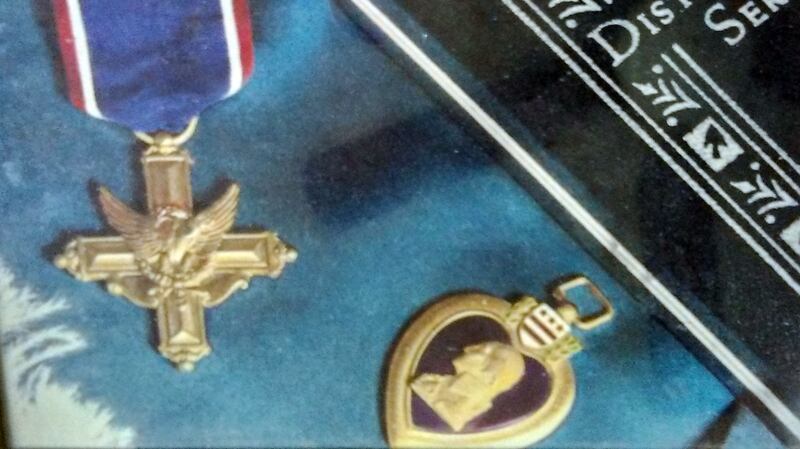
Distinguished Service Cross, and Purple Heart awarded to Elmy Matta.
Courtesy Rocio AlonsoThe other two boys and two of the girls also served in the army. The third girl, the youngest of the six, Alonzo’s mother, Maria Muniz, went her own way.
“She was the first woman U.S. Marine from Puerto Rico,” Rocio said.
Muniz managed to do so despite standing just five feet tall and weighing just 99 pounds. Her love of being a Marine was clear to anybody who might have expected her to wear a white dress at her wedding to her longtime boyfriend.
“She was married in her dress uniform,” Rocio later noted.
Muniz’s husband was a civilian, but she managed to get him a job on the base. She continued to be the happiest of Marines until she became pregnant and the policies of the time forced her to leave the corps with an honorable discharge. The couple stayed with one of her husband's classmates from the University of Miami, who was living at home.
“Then the parents found out they were Puerto Rican and they had to leave,” Rocio reported. “No kidding. I am not making it up.”
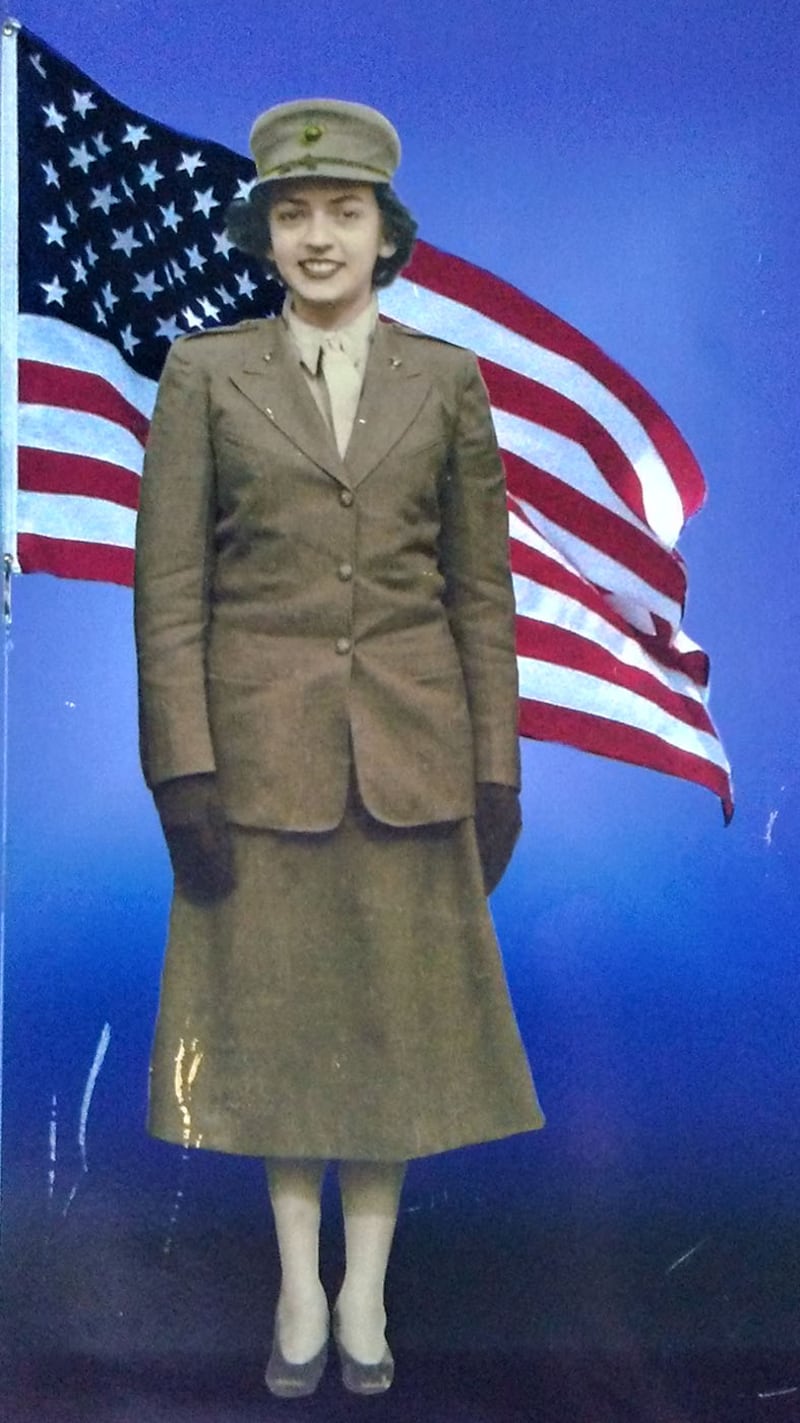
Maria Muniz, the first female Puerto Rican Marine.
Courtesy Rocio AlonsoThe couple headed west in a 1939 Packard. The former Marine who still grieved the loss of her war hero brother was too often treated as if she and her husband were unwelcome foreigners in the country where they were natural born citizens. They were unable to find jobs or housing.
“It was very difficult,” Rocio said. “Even if you had fought for this country.”
In California, the couple stayed with family. Muniz had already been forced from her beloved Corps for being pregnant and she did not want it now to keep her from working
“She borrowed some clothes and pretended to be overweight,” Rocio said.
Muniz worked until two weeks before she gave birth.
“Two weeks after, she was back at work,” Rocio said.
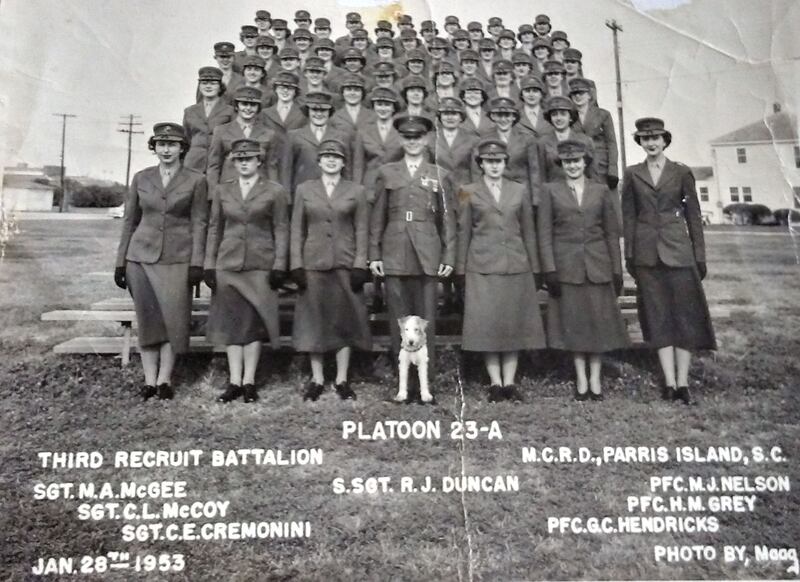
Maria Muniz in her platoon photo.
Courtesy Rocio AlonsoHer firstborn was Rocio. She then had a boy and named him Elmy after her fallen brother. Both children grew up on stories of the hero they would never meet.
“He was everybody's favorite person,” the younger Elmy told The Daily Beast.
The younger Elmy learned that his namesake was one of the nicest and friendliest guys you can imagine unless he saw that someone was taking advantage of somebody else.
“He would teach a bully a lesson,”’ the younger Elmy told The Daily Beast. “He wasn’t a big guy, but he was a hell of a fighter.”
One of the surviving uncles, Pepe Matta, never tired talking about the older Elmy.
“Always, ‘Why did it have to be him? He was the best of the best,’” the younger Elmy told The Daily Beast.
For a time, Maria Muniz returned with her husband and children to Puerto Rico, where there is a street in San Juan named Calle Teniente Matta, after the good lieutenant. They then settled in Miami, where Maria did bookkeeping and office work at a prominent law firm.
Her brother’s DSC had never been actually awarded to her family, and she now enlisted some of the firm’s attorneys in getting it done. A posthumous ceremony was held at Homestead Air Force base a half century after his death.
“She is very determined,” Alonzo said.
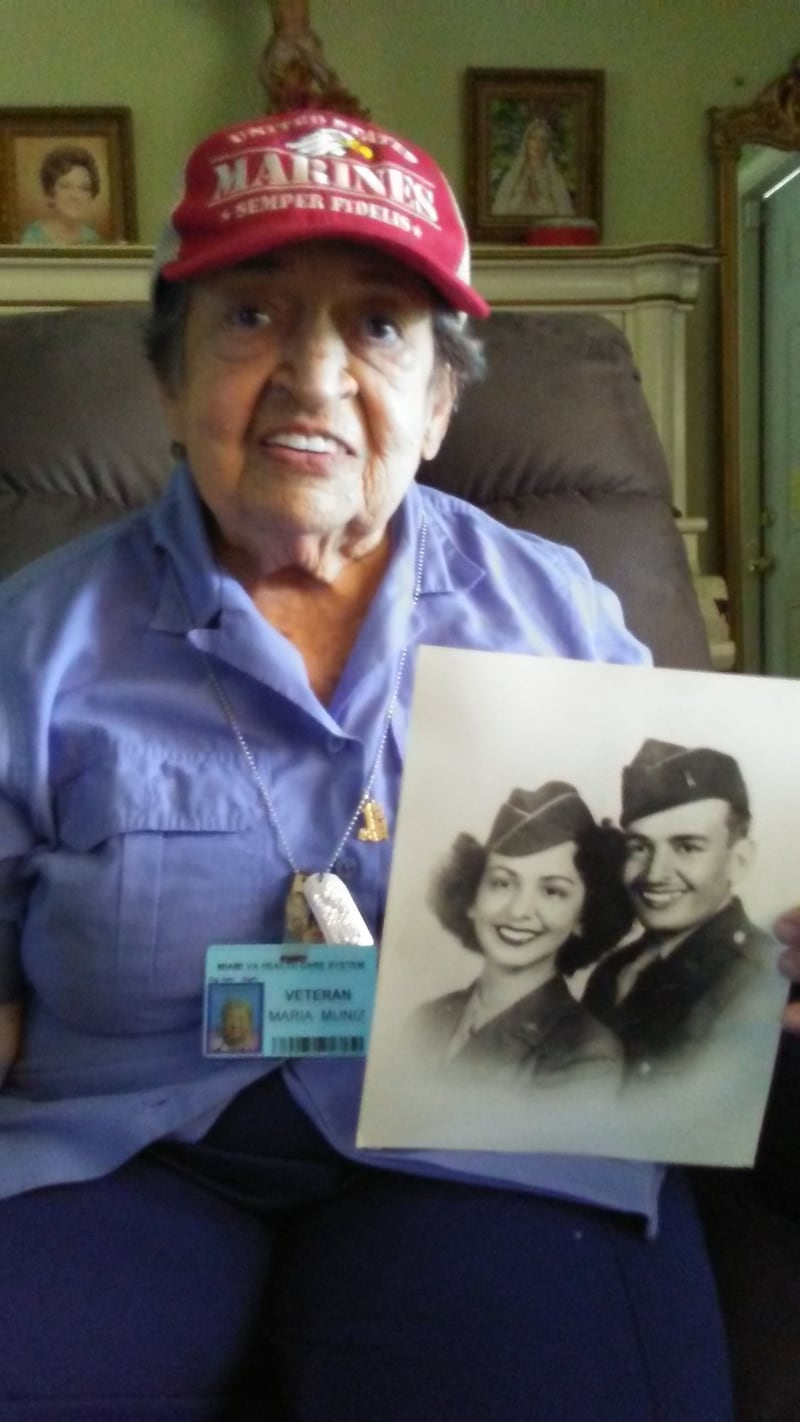
Maria Muniz, the first female Puerto Rican Marine, holds a photo of her siblings.
Courtesy Rocio AlonsoThe younger Elmy came of military age during the Vietnam War and he was prepared to enlist, but his mother made it clear that she would suffer another loss.
“She said, ‘I lost my brother, I don’t want to lose my only son,’” Elmy Muniz said.
He went on to start this own family and two of his four sons served in the army during our most recent wars, in Afghanistan and Iraq, one with the 160th Special Operations Regiment.
“They did deployments and went through all kinds of hell,” Elmy Muniz said of his sons.
Both returned safe. One left the army after 15 years. The other is in college. They of course know the stories of the man for whom their father was named.
After her husband died, Maria remained in the Miami house where they had settled after their time in Puerto Rico. The approach of Hurricane Irma prompted Rocio Alonzo to evacuate her mother to her own home in Orlando. The increasingly dire forecast caused them to seek refuge at a bed and breakfast in Fayetteville, Tennessee. Maria arrived with a walker while sporting a Marines baseball cap and caught the attention of the local newspaper, the Elk Valley Times.
In the aftermath of Irma, mother and daughter returned to their respective Florida homes. They still had Puerto Rico in their hearts when they saw the news coverage of it being struck by a second, stronger hurricane.
“To see Puerto Rico hit like that, it just breaks my heart,” Rocio told The Daily Beast. “Every time I see the reports, tears fall from my eyes,”
The tears from the daughter of Maria the Marine at the sight of the destruction wrought on the island by the hurricane of the same name were proof that you can be intensely from one part of this country, and be all the more American because of it.
“We can he completely American and at the same time be close to our roots,” Rocio said, thereby summarizing the secret of country’s greatness.
The conditions in Puerto Rico remain dire, and although Rocio did not say so, anybody would have to wonder if the initial lack of urgency on the mainland in the face of such a calamity was related to the prejudice that had once left Maria the Marine and her husband unable to find jobs or housing. Too many folks still do not consider Puerto Ricans to be as American as anybody.
One small sign of recuperation from the storm came on Friday when somebody answered the phone at the Puerto Rico National Cemetery. The director, Juan Nieves, reported that a number of the 33 employees had lost houses during the hurricane but everybody who was able to get to the cemetery was on the job the next day, checking graves and clearing trees.
“The recovery began,” Nieves told The Daily Beast
Some 80 percent of the trees were badly damaged or completely uprooted, but Nieves was able to tell the surprisingly number of anxious relatives who inquired that all the graves were undisturbed. That included the graves of numerous highly decorated heroes, among them grave 41 in Section A. 1st Lt. Elmy Matta rests there along with his daughter Nitza Margarita, whose life was so brief there is a single date for both her birth and her death: Nov. 9, 1945.
Matta was killed before he was able to have any other children, but his memory and spirit live on in Maria the Marine, and her daughter and her son, and the rest of the family. Rocio had a true patriot’s reaction when asked if she thought Trump should visit her fallen uncle’s grave at Puerto Rico National Cemetery next week.
“God Bless America, wouldn’t that be something?” she asked.






